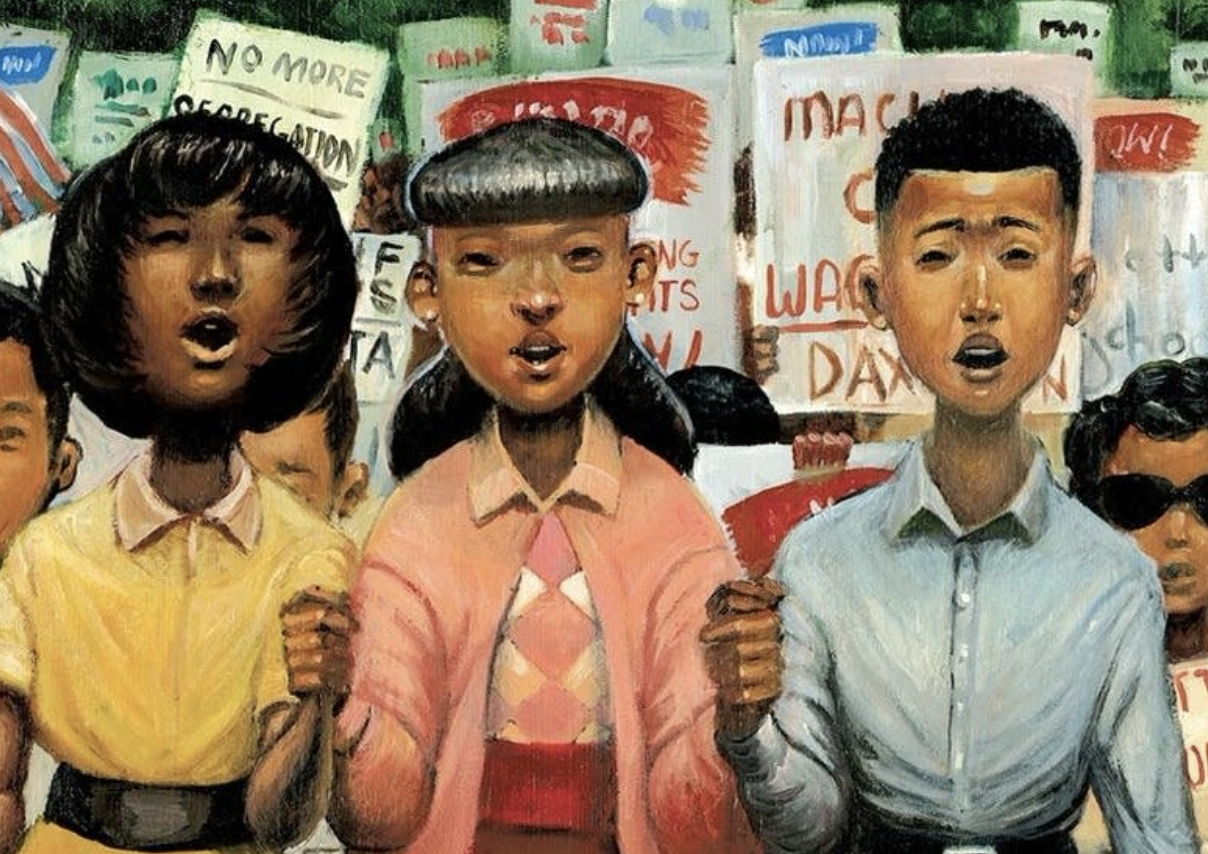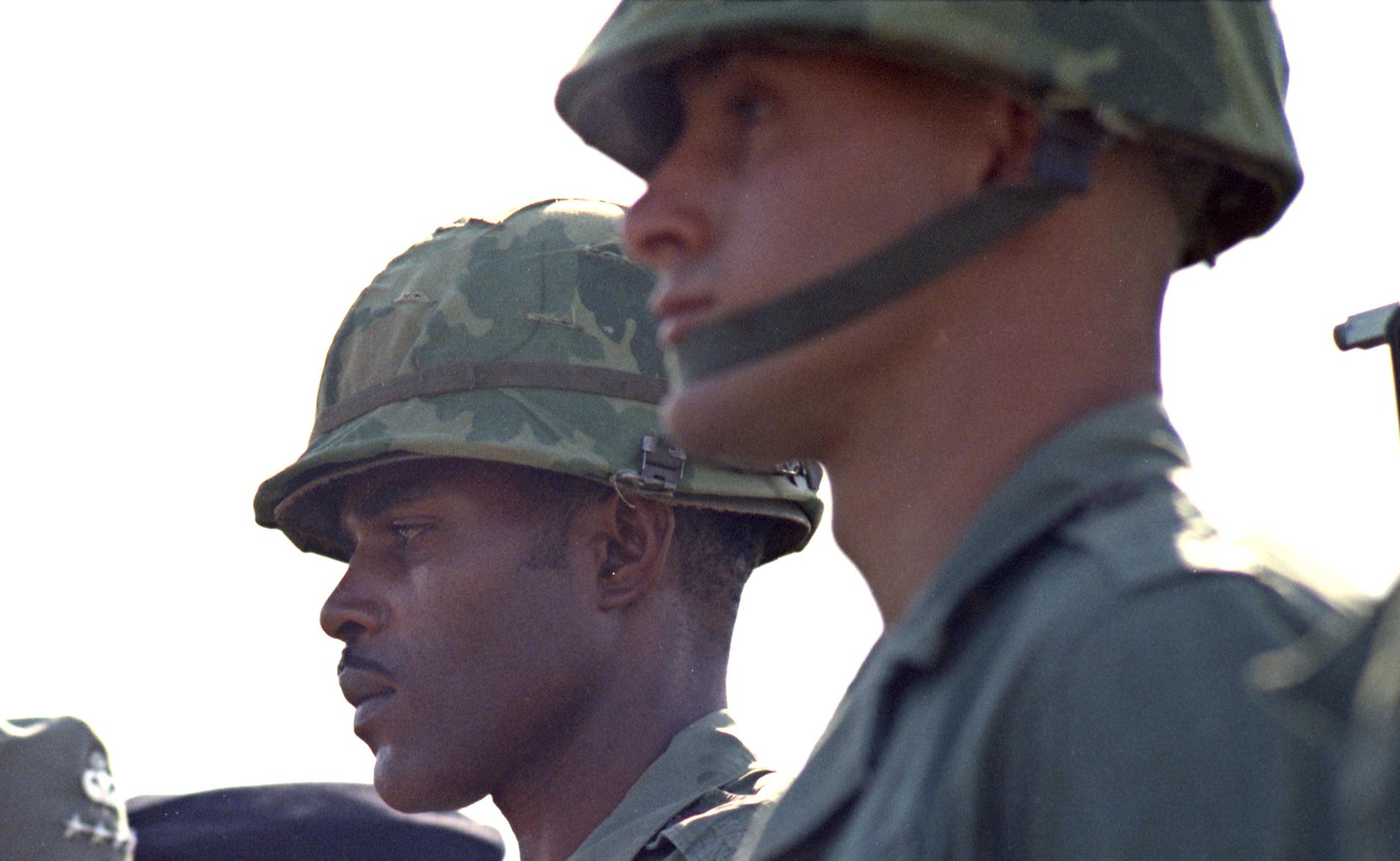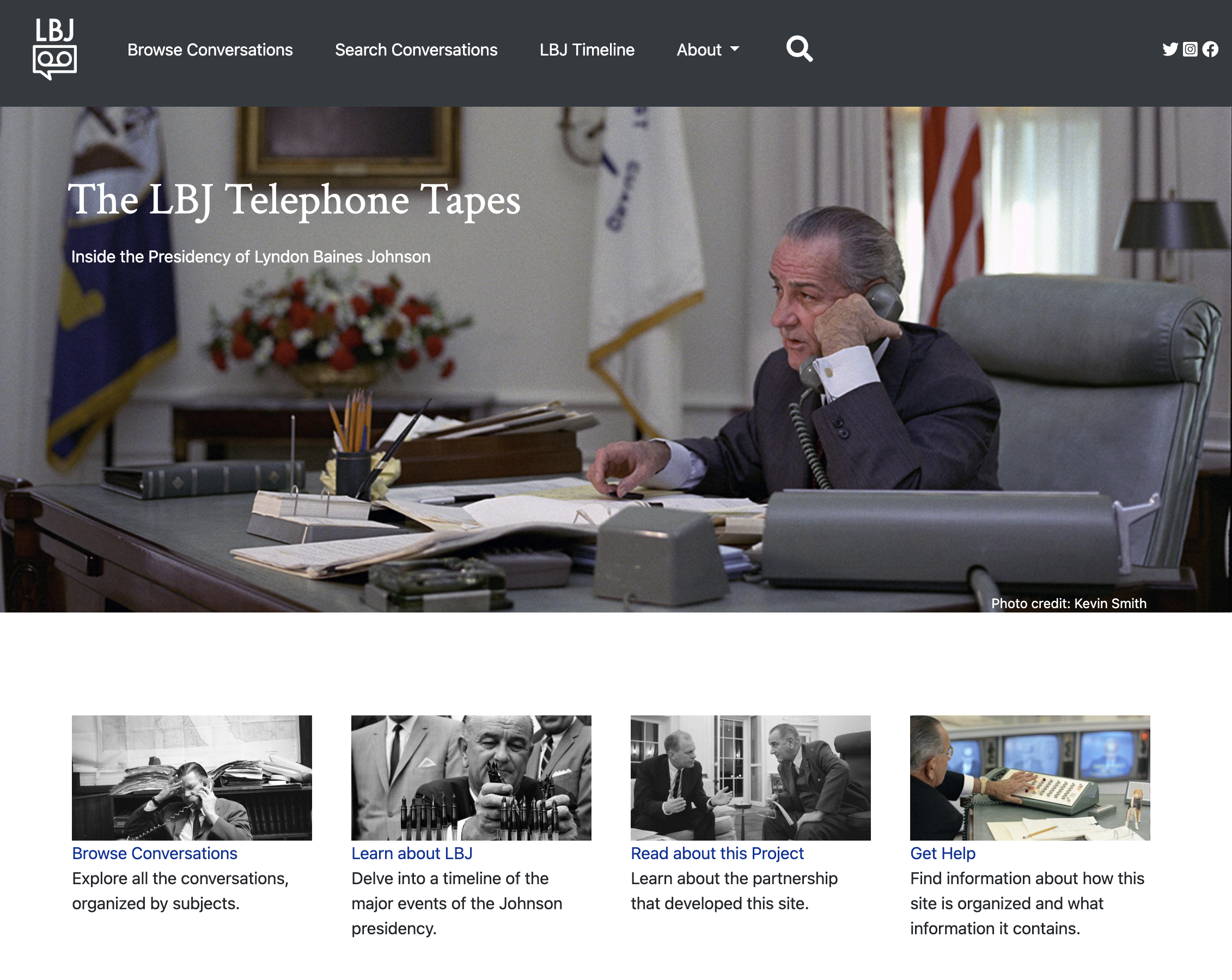LBJ's presidency included many critical historical moments. See what parts you can share in your classroom using our lesson plans and curricula.

Featured: History Channel Documentary - What the Hell is the Presidency For?
Lyndon Baines Johnson passed some of the most important civil rights legislation of the 1960s, which continues to impact Americans today.
Discover how he used the power of the presidency to strike deals, make trades, and form an alliance with Dr. Martin Luther King, Jr. to bring civil rights to the forefront of American politics. Special for educators in the Library's network, we have a digital copy of the documentary and a viewing guide available for you.
All Grades
Election Collection

Age: All grades
Topics: Presidential elections, political parties, political topics of the 1960s
Learn about the presidential election of 1964 by analyzing and evaluating objects from the Johnson and Goldwater campaigns. Make connections to other presidential elections through the National Archives platform, DocsTeach.
Civics for all of US

General
Civics for All of US is the national civic education initiative from the National Archives. Our interactive distance learning programs draw upon the vast holdings of the National Archives to promote the knowledge and skills students need for civic engagement in the 21st century. Each program is led by one of our educators located at National Archives sites, the Center for Legislative Archives, and Presidential Libraries across the country.
Our new online registration tool makes it easy to request a distance learning program from an available National Archives educator. Try it today and request a program for 10 or more students at https://civics.archives.gov/. Online registration is currently open through December 16, 2022. Registration for the Winter/Spring 2023 will open January 9, 2023.
Civics for All of US distance learning programs are offered as regularly scheduled interactive webinars. Registration is required, but there is no minimum attendance prerequisite for student webinars. Join us for an upcoming program!
Join us for this free, interactive virtual professional development program for educators as we look closely at selected examples of American Indian treaties and discuss ways to incorporate teaching these important documents in the elementary classroom. We will look to the Constitution to learn why treaties are “the supreme law of the land,” interact with primary sources from the National Archives.
Pre-kindergarten and Lower Elementary Education
All Are Welcome

Age: Pre-Kindergarten and Kindergarten
Topics: Identity, Differences, Acceptance
Children and adults come from all backgrounds and cultural identities. Help students to understand their familial and cultural identities and celebrate the beauty of their uniqueness. In this activity, students will engage in a read aloud to help better understand and welcome the differences all around them and recognize how they contribute to your class.
A Vote Is a Powerful Thing

Age: Early Elementary
Topics: Voting, Campaigns, Election, Activism
The power of the vote rests in the hands of all American citizens. This process is complicated and requires understanding of campaigning, informed decision-making and voting, and the process of an election. This activity helps students to understand those aspects of citizenship in a developmentally friendly way. In this activity, students will explore these topics in a read aloud about the campaign and voting process and then participate in a simulated campaign– complete with a class vote!
Upper Elementary School to High School
Let the Children March

In 1963, children joined the fight for Civil Rights in Birmingham, Alabama. They peacefully protested, found themselves thrown in jail, and successfully accomplished what they set out to do. Help students examine the role that America's youth can play in movements like the Civil Rights movement through this picture book analysis and perspective activity.
Presidential Powers

Age: Upper Elementary to High School
Topics: The presidency, presidential powers, roles of the president, Article II of the Constitution, United States government
The formal powers of the president were outlined in Article II of the Constitution, however, the informal roles and responsibilities of the president have continued to evolve over the history of the United States. In this activity, students will examine primary sources to determine which presidential power it best represents.
The Spy's Dilemma

Age: Upper Elementary School to High School
Topics: Cold War, Space Race
Become a Soviet spy and evaluate documents from President Johnson's secret files to determine the most valuable information to bring back to Moscow.
Middle School and High School
Civil Rights for All: The Longoria Affair

Topics: Civil Rights, Dr. Hector P. Garcia, Senator Johnson, Felix Longoria, Texas History, WWII
Use primary sources to examine the controversy to bury WWII soldier Felix Longoria in his hometown of Three Rivers, Texas. Students will use documents to watch the story unfold and take a deep dive into the realities of civil rights in 1940s Texas.
Continuing the Great Society

Age: Middle School and High School
Topics: The Great Society, War on Poverty, Civil Rights, Education, Environment, Healthcare, Immigration, Voting Rights
Evaluate primary source documents related to President Johnson's Great Society programs and choose one program to update for today. Propose your updated legislation and take a vote to see which bills could be sent to the president’s desk.
Document Analysis: The Fork In The Road Memo

Age: Middle School and High School
Topic: Vietnam War
Students analyze the primary source text of McGeroge Bundy’s Fork in the Road Memo to President Johnson and examine the choices the President had to consider when determining how to proceed in Vietnam.
Student Document Analysis Worksheet
Document Analysis: It's A Mess Phone Call

Age: Middle School and High School
Topic: Vietnam War
Students analyze the primary source audio phone call between President Johnson and Senator Richard Russell to better understand the challenge facing the President when it came to escalating troop commitment in Vietnam.
Student Document Analysis Worksheet
Jim Crow to Johnson

Age: Middle School and High School
Topic: Civil Rights
Students analyze primary source texts, photographs, and biographies to trace the history of civil rights from the passage of Jim Crow laws to the Civil Rights Act of 1964.
The Path to the Presidency

Piecing Together History: Gulf of Tonkin

Age: Middle and High School
Topics: Gulf of Tonkin, Vietnam War, Presidential Decisions
Should the U.S. increase their military presence in Vietnam following the events of the summer of 1964? Participants will work in teams to gather evidence to determine how to advise the president, competing against other advisers to determine the order in which the president will hear your input.
Piecing Together History: The Voting Rights Act

Age: Middle and High School
Topics: Voting Rights, Civil Rights, Selma, Dr. Martin Luther King, Jr., Governor George Wallace
Follow the journey for voting rights and evaluate primary sources to determine whether or not the Voting Rights Act was necessary. Teams will gather evidence to support a stance on voting rights legislation and will work towards completing a final secret task.
High School
A Civil Rights Investigation: Mississippi Burning

Age: High School
Topics: Civil Rights, Freedom Summer, Voting Rights
Investigate the disappearance of three civil rights workers during the Freedom Summer of 1964 using telephone conversations, oral histories, and documents as evidence to solve the case.
This frequently used lesson has also now been adapted to an online format ideal for independent and virtual learning settings. Visit it here.
I Shall Not Seek: LBJ's Decision Not to Run in 1968

Unfortunate Son: The Vietnam War Experience

We Shall Overcome: The Fight for Voting Rights

Age: High School
Topics: Civil Rights, Voting Rights, Bloody Sunday, States Rights
Follow the journey from the Civil Rights Act of 1964 to the Voting Rights Act of 1965 using primary sources, including telephone conversations with Dr. Martin Luther King, Jr., and telegram correspondence with Alabama Governor George Wallace.
We Shall Overcome: The Fight for Voting Rights

Age: Upper Elementary to High School
Topics: Voting Rights, right to vote, Discrimination, Disenfranchise, Literacy test, Poll tax, Segregation
This lesson has been adapted to an online format ideal for independent and virtual learning settings.
Practice Questions

Age: 11th Grade
Topics: Civil Rights, Cold War, Great Society, Vietnam War
Support the new requirements of the redesigned State of Texas Assessments of Academic Readiness (STAAR) Test with the help of the LBJ Library and primary sources of the Johnson Administration.
Other Resources
Digital Museum Collection

The Digital Museum Collection brings the LBJ Museum collection into your classroom. All artifact images are public domain and can be used as needed. Political cartoons should be cited when used.
Discover LBJ

Discover LBJ is the best search feature to find primary source documents for your classroom and curriculum needs. All documents are public domain and can be used as needed.
DocsTeach

DocsTeach is an online platform from the National Archives that allows teachers to explore thousands of primary sources, as well access or create primary source focused online activities.
The activities listed below were created by the LBJ Presidential Library education team. For more information on how to use DocsTeach and create your own activities, here are some helpful instructional guides.
- Civil Rights or Freedom? When Vietnam and the Civil Rights Movement Clashed
- The Path of Justice: Selma & the Voting Rights Act
- The Gulf of Tonkin Incident and Resolution
- The Vietnam War Timeline: Understanding the Nature of a Controversial Conflict
Highlights From Our Holdings: The Vietnam War

Access primary sources on the topic of the Vietnam War, including documents around the Gulf of Tonkin and escalation of the war, as well as telephone conversations with President Eisenhower, Secretary of Defense Robert McNamara, and National Security Advisor McGeorge Bundy.
LBJ Photo Archive

Discover LBJ is the best search feature to find photographs for your classroom and curriculum needs. All photographs are public domain and can be used without permission.
LBJ Telephone Tapes

The LBJ Telephone Tapes: Inside the Presidency of Lyndon Baines Johnson is a collaboration between the Lyndon B. Johnson Presidential Library and Foundation and the University of Virginia’s Miller Center of Public Affairs. Featuring conversations from the secret tapes recorded by President Johnson during his time in office, The LBJ Telephone Tapes provides extraordinary access to Johnson’s thinking on a range of matters, both foreign and domestic.

